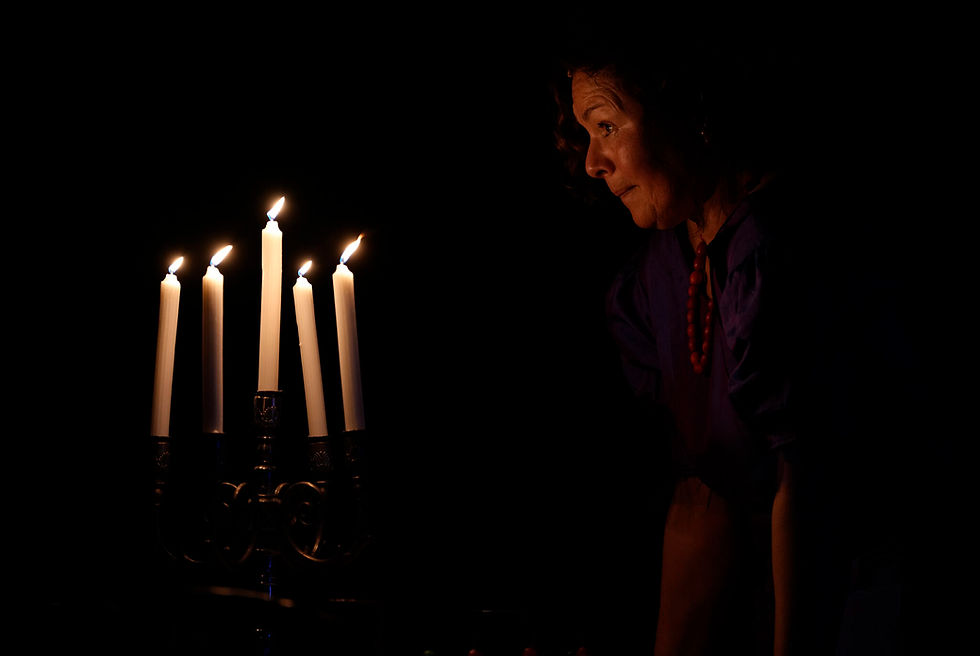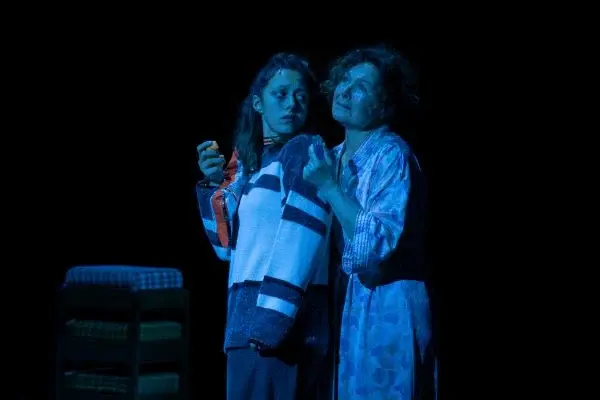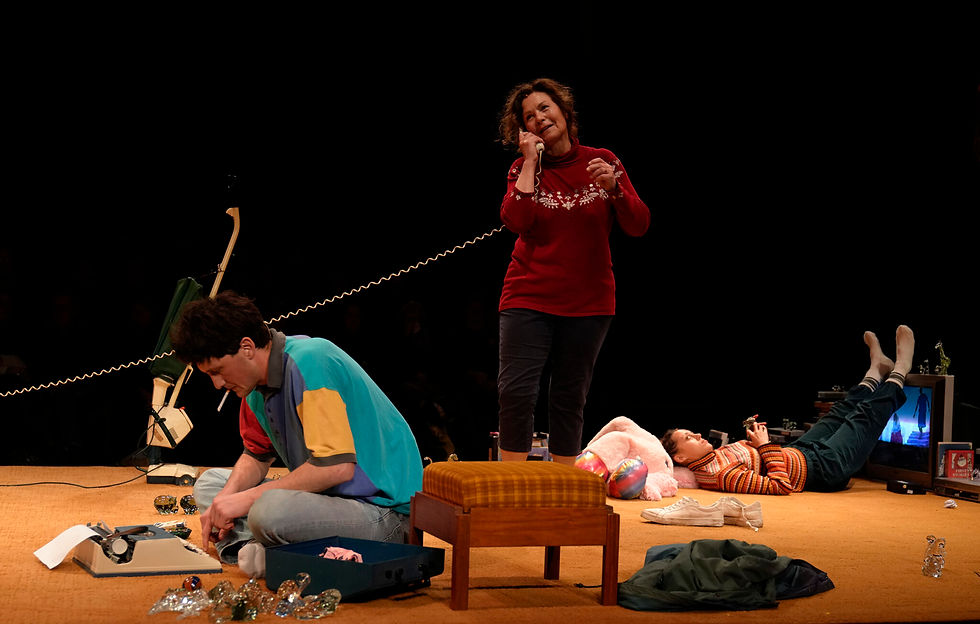SPOTLIGHT: Nico Scheepers reflects on his twin adaptions of Tennessee Williams' THE GLASS MENAGERIE
- Aug 4, 2025
- 7 min read
Barbara Loots
A set of twin adaptations of Tennessee Williams’ timeless masterpiece grace the Baxter Theatre'se Flipside stage this month in the form of Nico Scheepers’ SPEELGOED VAN GLAS / THE GLASS MENAGERIE. It still reflects on the fine web of love and loss, spun by a matriarch to keep her family together at all costs –despite all of them trying to escape– but transports Williams’ 1930s vision to the ‘90s with a distinctively South African sense of ‘nostalgia’. We asked Scheepers to share some insight into the journey he took to create his two South African versions of a classic in this latest SPOTLIGHT.

There’s a current debate in the theatre community about the South African theatre trend of translation and adaptation of existing (mainly international) plays as opposed to creating new work, and if funding should be given to the former as instead of developing the latter. Investing in translations and adaptations has specifically appeared to be the trend in Afrikaans theatre the last few years. With SPEELGOED VAN GLAS being an adaptation of Tennessee Williams’ beloved classic THE GLASS MENAGERIE, it seems a great opportunity to ask Scheepers to weigh in on this debate.
“Classics bring with them a kind of cultural capital and legacy. But beyond that, I think there’s something more nuanced at play. Afrikaans theatre has always had a complex relationship with identity, language, and heritage. Adapting international texts offers a way to interrogate ourselves through someone else’s story –to trace the shadows of our own families and ghosts inside familiar frameworks.”
Apart from the cultural introspection it offers, there is also a personal side to it for him as a creative:
“Translating a foreign masterpiece into your own language and culture is an incredibly humbling learning experience as a theatre-maker. It allows me to interrogate the architecture of a proven mould –to understand how it breathes, how it’s built. It’s a completely different exercise to writing an original play. When I write an original work, I’m dreaming something new. But when I adapt or translate something I already love, I am re-dreaming –translating not just words, but tone, gesture, silence. It’s like gilding a specific mirror, one that only reflects a certain face, for a very specific audience. It teaches humility. And precision.”

THE GLASS MENAGERIE then being a kind of dream-like memory of the narrator blurring the lines between truth and subjective recollection, it seems the ideal play for such a very personal exploration. As a personal favourite, it has also haunted Scheepers for years:
“The play hits disturbingly close to home –it feels like a single tension wire stretched across the entire runtime. From the first moment, you know it won’t end well. But like life, the only way out is through. It's melancholy, hopeful momentum –underpinned by inevitable failure and tragedy– is what makes it a masterpiece. What inspired me most was how the play holds so much tension in stillness. Williams doesn’t need fireworks; he needs a flicker of light, a pause too long, a line half-spoken. The restraint is powerful. The family’s dysfunction is never performed –it just exists, like the weather.”
Reflecting on this through a South African lens was also important to Scheepers, wanting to elevate SPEELGOED VAN GLAS beyond just a translation and a study of words.
“I wanted to uncover the cultural code beneath”, he explains. “In adapting the play, I relocated it to a conservative Afrikaans household in the 1990s, where silence, sacrifice, and appearances carry enormous weight.”
"Translating the iconography of the original 1930s setting to a 1990s South African home was one of the most rewarding parts of the process. Laura’s gramophone becomes a clunky tube TV and a stack of VHS tapes. Her glass animals now live beside Pocahontas, Aladdin and Moomin. These aren’t just props –they’re authentic, emotional anchors.”

The setting then not only anchors the story in the nostalgia of ‘90s South Africa, but also roots the emotions of the character… all with a clear message that a sense of nostalgia does not always have a positive ring to it:
“Suddenly, Amanda’s anxiety made sense. Tom’s longing to escape became more urgent. And Laura embodied the quiet tragedy of a girl taught to disappear into herself.”
In a world that feels as if it is collapsing in on itself and losing its hard-won sense of freedom and identity under the pressure of what feels to be a heightened sense of conservatism, a reminder of why the ‘90s felt so loaded with trouble and trauma is all too relevant now. A strong dose of remembrance seems to demand a revival of the lessons encapsulated in Tennessee Williams' classic memory play, the latter being the style of theatre the world ascribed to Williams’ particular form of genius.
Scheepers’ SPEELGOED VAN GLAS very deliberately leans into this theatrical style. In fact, Scheepers’ Tom rather candidly tells the audience upfront that this is a memory play, where Williams never described his own plays as such.
“We’ve tried to honour the original by approaching it as memory theatre in the truest sense –fragmented, subjective, emotional. The design is stripped back and intentionally minimal, with the audience seated on either side of the space. That setup makes everything feel more exposed –more intimate. The family’s vulnerability is amplified when there’s nowhere to hide. There’s a deep awareness of the voyeurism baked into the staging: the sense that you’re watching private moments unfold, again and again, through the unreliable lens of memory.”

It is then no wonder that the award-winning SPEELGOED VAN GLAS has done so well in winning over theatre lovers while touring the festival circuit since it premiered last year at Woordfees. This success presented Scheepers with another challenge, to take his vision further in adapting his Afrikaans reimagining of William’s classic into an English version, while maintaining a sense of SPEELGOED’s authenticity. A process he describes as “surprisingly complex”, precisely because the Afrikaans version was not simply a translation. SPEELGOED VAN GLAS had become “its own creature, shaped by local rhythms, references, and inherited silence”. Taking it 'back' into English called on Scheepers to “re-negotiate tone, idiom, and nuance”, but also granted him the opportunity to discover new elements of the story. The end result is a somewhat different English THE GLASS MENAGERIE to that of William's play by the same name: It’s "a sibling to the Afrikaans version, not a mirror".
In creating this complimentary dynamic, Scheepers took care to retain its true sense of drama, avoiding the trap of forcing a comical sense of language onto it to give it a South African feel –that being the short cut creatives so often take when they localise an international work. “The most difficult part of the re-translation was preserving the fact that this is, undeniably, an Afrikaans family –one that just happens to be speaking English", Scheepers agrees.
“I approached the language as if the English is a kind of subtitle, a translated memory filtered through time and perspective. From the very first scene, the audience should feel that these characters think in Afrikaans. Their emotional rhythms, silences, and relational dynamics remain rooted in that world. Importantly, this approach is decidedly not comical. There’s no attempt to mimic or caricature 'Afrikaans English' for the laughs. Instead, we retained certain Afrikaans words and phrases –terms of endearment, cultural references, bits of vernacular– not for effect, but for authenticity. These are words all South Africans know, regardless of language. Their presence reminds us where this family comes from, even when the surface language has shifted. The arrival of the English-speaking dinner guest in the second half sharpens this contrast even more, and becomes part of the dramatic tension –just as it was in the original.”

Scheepers has clearly worked very hard to prevent his English version from merely being a reworking of the Afrikaans adaptation ‘back’ into Williams’ English. So, one has to wonder why he nevertheless chose to retain Williams’ classic title.
“Cultural capital” is the honest answer. “Because THE GLASS MENAGERIE is a memory structure, not just a play. The title evokes its themes –fragility, illusion, preservation. Even as we made it our own, we wanted to honour the source material. The Afrikaans title (SPEELGOED VAN GLAS) already reframes it culturally, but in English, retaining the original title maintains a thread to Williams’ legacy, while allowing us to subvert it from within.”
If the duality of the adaptation exercise was no mean feat from a writing perspective, there must have been challenges too for the cast (along with Scheepers as director) who for the last few months touring the festival circuits have settled into the Afrikaans version. Making that mental jump to an English text must have been difficult, as you are asking them to go against the muscle memory of the production. Scheepers admits that it was indeed a tough task for them all, because “language sits in the body”:
“It’s not just about words, but breath, tone, posture. Shifting between the two required unlearning. But the reward was profound: it exposed new emotional registers in the characters. We discovered moments that only revealed themselves in English, just as others lived most truthfully in Afrikaans. The cast has been extraordinary –willing to stay porous, alive to each shift."

Ultimately, if Tennessee Willams was still alive to see Scheepers’ adaptions he would hope that the legendary playwright would still recognise his play, even though the language and setting may be different, and appreciate that care has been taken with his characters, because this exercise was not one of imitation but rather one of connection:
“His story gave us a way to speak about our own families, our own longing. And I think he’d be genuinely shocked –in the best way– by the talent of our South African actors and technical teams. Their vulnerability, their precision, their ability to carry this story so effortlessly... I'd like to think he’d leave moved, and maybe a little surprised."
In a similar way Scheepers hopes that SPEELGOED VAN GLAS / THE GLASS MENAGERIE also moves audiences who come to see it at the Baxter Theatre as they reflect on the fact “that grief and memory are not bounded by culture or time”:
“That the ache of wanting more –for yourself, your family, your life– is a universal hunger. And that silence, especially in families, is its own form of violence. I hope people leave the theatre feeling cracked open, but also comforted by the beauty that remains in the wreckage.”
To get the full impact of this experience, Scheepers would encourage theatre lovers to see both the Afrikaans and English versions, as it will give them a different, complementary perspective of his South African adaptations.
“The two versions are twins with different hearts”, he reflects. “Seeing both allows you to feel the temperature change between languages, to understand how form shapes feeling. You'll notice different tensions, different strengths. It’s the same house, but the light falls differently on the furniture."
THE GLASS MENAGERIE is onstage at the Baxter Theatre until 7 August 2025, after which SPEELGOED VAN GLAS runs until 16 August 2025. Both versions are performed by a stellar cast featuring Anna-Mart van der Merwe, Carla Smith, Ben Albertyn, Mark Elderkin, with direction and design by Scheepers. Tickets can be booked online through Webtickets.

.png)